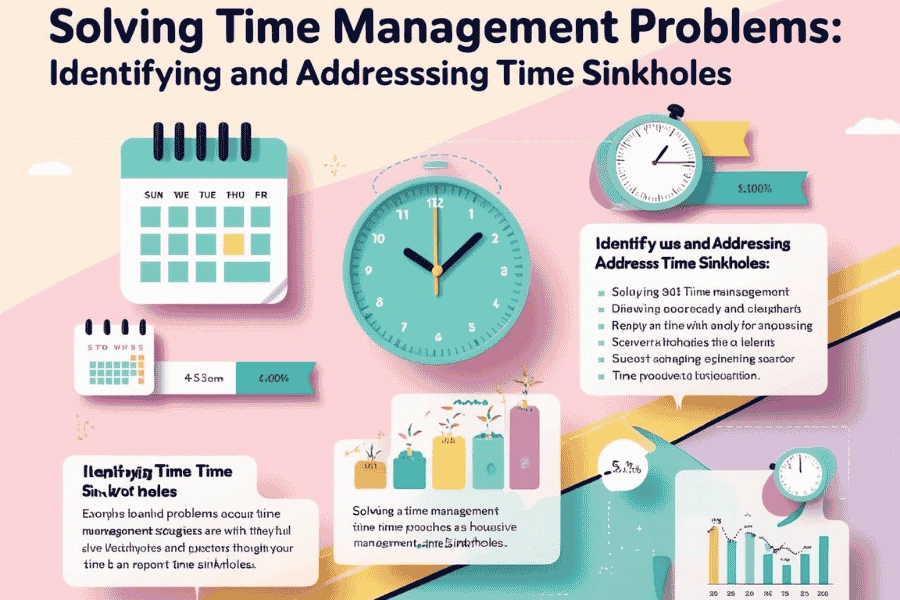Solving Time Management Problems: Identifying and Addressing Time Sinkholes
Introduction
Effective time management is a cornerstone of productivity and success in both professional and personal spheres. However, many individuals struggle to manage their time effectively due to hidden “time sinkholes” — activities or distractions that consume large amounts of time without yielding meaningful results. Identifying and addressing these time sinkholes is crucial to reclaiming lost time, enhancing focus, and achieving goals more efficiently.

What Are Time Sinkholes
Time sinkholes are tasks, habits, or distractions that drain time and energy without contributing significantly to objectives or productivity. These can include excessive social media browsing, unnecessary meetings, multitasking, unclear priorities, or procrastination. Because they often seem harmless or routine, time sinkholes frequently go unnoticed, gradually eroding valuable time.
Common Sources of Time Sinkholes
Some of the most common time sinkholes include digital distractions like email overload, instant messaging, and notifications. Meetings without clear agendas or outcomes also consume large chunks of time. Poor planning and lack of prioritization cause individuals to spend time on low-impact tasks. Additionally, perfectionism and the inability to delegate work can slow progress and increase inefficiency.
Identifying Your Personal Time Sinkholes
To effectively address time sinkholes, one must first identify them. Time-tracking tools and techniques such as journaling or digital apps can reveal where time is being spent. Reflecting on daily routines and analyzing which activities yield little return helps uncover hidden time drains. Seeking feedback from colleagues or mentors can also provide valuable insights into inefficient habits.
Strategies to Address Time Sinkholes
Once identified, various strategies can mitigate time sinkholes: Prioritization: Use frameworks like the Eisenhower Matrix to focus on important and urgent tasks, while deferring or delegating less critical activities. Time Blocking: Allocate specific time slots for focused work, meetings, and breaks to structure the day and reduce distractions. Limiting Digital Distractions: Turn off non-essential notifications, set specific times to check emails, and use website blockers for social media during work hours. Improving Meeting Effectiveness: Ensure meetings have clear agendas, defined roles, and actionable outcomes, and consider shorter or fewer meetings. Delegation and Automation: Delegate tasks that others can handle and automate repetitive work using tools and software. Mindfulness and Breaks: Incorporate short breaks and mindfulness practices to maintain focus and reduce mental fatigue.
Overcoming Psychological Barriers
Time sinkholes often stem from psychological barriers such as procrastination, fear of failure, or perfectionism. Techniques like setting SMART goals, breaking tasks into smaller steps, and using rewards can help overcome these barriers. Cultivating self-awareness and adopting a growth mindset encourages continuous improvement in time management.
Monitoring and Continuous Improvement
Clarity and Focus
Effective time management requires ongoing monitoring and adjustment. Regularly reviewing progress and reassessing time allocation helps identify new or recurring sinkholes. Adapting strategies based on changing priorities and circumstances ensures sustained productivity and work-life balance.
Conclusion
Time sinkholes silently undermine productivity and goal achievement, but with awareness and deliberate action, they can be managed effectively. By identifying these hidden time drains and applying targeted strategies, individuals can reclaim control over their schedules, enhance efficiency, and achieve meaningful results. Mastering time management is an ongoing journey that empowers both personal growth and professional success.
Active Events
3 Essential Projects to Elevate Your 5c of Content Marketing Portfolio
Date: Aug 05, 2025 | 7:00 PM(IST)
7:00 PM(IST) - 8:10 PM(IST)
2432 people have registered
3 Must Have Projects On your CV to Get into Data Analysis
Date: Aug 05, 2025 | 7:00 PM(IST)
7:00 PM(IST) - 8:10 PM(IST)
2753 people have registered
Bootcamps
Digital Marketing Bootcamp
- Duration:4 Months
- Start Date:Aug 09, 2025
Data Science Bootcamp
- Duration:4 Months
- Start Date:Aug 09, 2025
